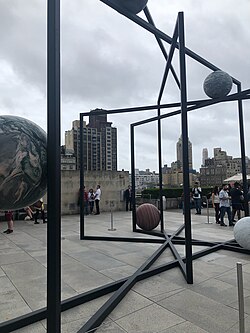| Parapivot | |
|---|---|
 | |
| Artist | Alicja Kwade |
| Year | 2019 (2019) |
| Medium | Sculptures of stone and steel |
| Subject | Space |
| Location | Metropolitan Museum of Art, New York City |
| Coordinates | 40°46′43″N 73°57′53″W / 40.7787°N 73.9646°W / 40.7787; -73.9646 |
| Website | Metmuseum.org - Alicja Kwade - Parapivot |
Parapivot is a commissioned installation by Alicja Kwade at the Iris and B. Gerald Cantor Roof Garden of the Metropolitan Museum of Art. The installation consists of two sculptures, Parapivot I and Parapivot II, each consisting of multiple steel frames which hold polished stone balls.
Description
Across the two pieces, there are nine balls, each made of marble and granite, sourced from nine different countries, including Brazil, Germany, India, Italy, Norway, and Sweden. Each of the balls, one of which weighs 1.6 short tons (1.5 t), is intended to signify one of the nine planets of the Solar System. The balls are held in place by supports in the steel frames. The installation is similar to We Come in Peace, the preceding installation by Huma Bhabha, in that they both relate to outer space.
Alicja Kwade said that the skyscrapers in the landscape behind the installation were representative of capitalism and compared the associated people to gods. She said that the art was intended to "put planets on top of ". She also said that the installation was meant to evoke thinking about the nature of the Earth. According to The New York Times, Kelly Baum said that Kwade was chosen for the commission because her work engaged with science, especially astrophysics and illusionism. Initially, the Met wanted Kwade to produce an item similar to WeltenLinie for the commission.
Critical response
Taylor Dafoe of Artnet News observed that Kwade's work was informed by "cosmic clarity" and "worldly wonder". Dafoe also noted that the sculptures were reminiscent of kinetic art, despite not having any moving parts. Zachary Small for Hyperallergic wrote that in the installation, Kwade captured "the universe’s unfathomable scope into a few frames" and engaged the tensions between art and science, as they relate to "objective truth". Jason Farago of The New York Times said, "Her sculpture makes use of optical tricks and careful positioning to evoke the instability, and the unknowability, of our place in the world." He also wrote that the two sculptures engage flawlessly with the landscape of New York City and synthesize "sculpture, city and universe".
References
- ^ Weaver, Shaye (2019-04-15). "'Outer space' comes to the Met's rooftop with 'Parapivot'". am New York. Retrieved 2019-06-21.
- Klimoski, Alex (2019-04-18). "The Met's Annual Rooftop Commission Opens for the Spring 2019 Season". www.architecturalrecord.com. Retrieved 2019-06-21.
- ^ Dafoe, Taylor (2019-04-16). "Artist Alicja Kwade Wants You to Pause and Reflect on the Cosmic Wonder and Vastness of the Universe". artnet News. Retrieved 2019-06-21.
- ^ "On the roof of New York's Metropolitan Museum, planets and skyscrapers collide". english.alarabiya.net. 2019-04-16. Retrieved 2019-06-21.
- Halle, Howard (2019-04-16). "Check out the celestial new rooftop installation on top of The Metropolitan Museum Of Art". Time Out New York. Retrieved 2019-06-21.
- ^ Small, Zachary (2019-04-19). "Capturing the Unfathomable Cosmos on the Met Museum's Rooftop". Hyperallergic. Retrieved 2019-06-21.
- ^ Farago, Jason (2019-04-18). "Celestial Visions on the Met Roof". The New York Times. ISSN 0362-4331. Retrieved 2019-06-21.
- ^ Rogers, Thomas (2019-03-29). "On the Met Roof, Alicja Kwade's Test of Faith". The New York Times. ISSN 0362-4331. Retrieved 2019-06-21.
Further reading
- Baum, Kelly; Wagstaff, Sheena (2019). Alicja Kwade: ParaPivot. The Roof Garden Commission. New York: The Metropolitan Museum of Art. ISBN 978-1-58839-667-9.